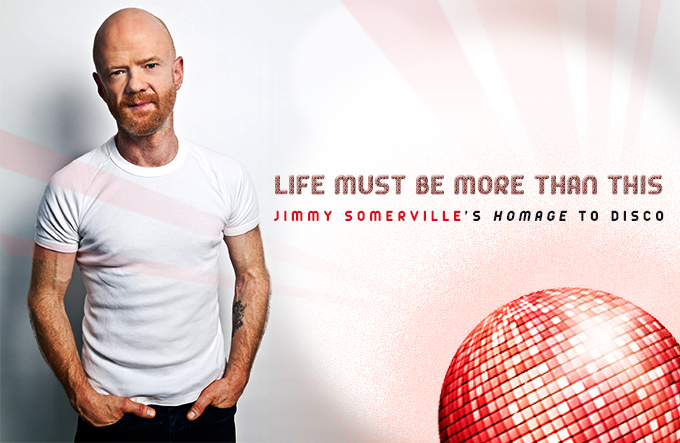
GRAB ONTO OPTIMISM :: Angel-voiced Scotsman Jimmy Somerville first rose to queer icon status in the 1980’s, singing Bronski Beat’s gay anthem “Small Town Boy”. The song’s upfront video, which showed a young gay man leaving smothering suburbia and mum and dad in bold pursuit of homoerotic misadventures in the big city, was especially on the leading edge of sexual politics and freedom, striking a deep cord with young gay people around the world.
As Somerville gets set to release Homage, his tribute to disco on March 10th (pre-order here), GGN publisher Shaun Proulx spoke to the star in London about his music new and old, the nature of risk, and how in the end, all we really want is for someone to pass us a tambourine.
Shaun Proulx: I feel so lucky to be able to talk to you, Jimmy. You have no idea what kind of influence you had on me. I was small town boy hungry for a taste of who I really was, and like so many others, I recognized myself in the song and video with such truth I would make sure my parents weren’t watching me watching you. You must hear things like that a lot though.
Jimmy Somerville: I have, and it’s really strange, because for quite a good part of my life I used to feel uncomfortable with it. It took a while to realize the song and the video were not about me really, it’s almost as though I was some kind of a vessel to carry something I really believed in. There’s a message in that song, there’s a message in the video, and it came out of honesty, it came out of indignation, and all that stuff about what I believed in, and what was really firing me up at such a young age. So it’s a very powerful, powerful song, I believe, and that’s why I think it’s such an enduring and lasting influence. I’m really proud to be part of it, and that’s part of my history too.
SP: Did you know you were being a trailblazer?
Jimmy Somerville: I knew that as soon as I gave up my anonymity it was going to be controversial, because when I gave up my anonymity, I was also seeing who I was, where I was coming from, what I believed in, what my passions were, and I was also coming from a political agenda as well, because that was the early 80’s, and that was the real explosion of sexual politics. I was turned into the gay singer, and it would have been nice to be the singer who happened to be gay. But I guess because I was younger, and I had that energy, and that fire in my gut, the only thing I could come back to was the truth, so that’s where I was coming from.
SP: Soon after your small town boy got to the big city, this small town boy got to one too. And once again, there you were. Just when I’m exploring my sexuality and going out to bars, and getting laid a lot, and falling in love a lot, dancing a lot – you are in the orbit with “You Make Me Feel So Mighty Real”, “Never Can say Goodbye”. And here we are all these years later, as you are bursting back into disco-mode again. What is it with disco?
Jimmy Somerville: I think the difference is, with this album, I really truly am bursting into disco. Homage is not like a pastiche of disco, we’ve done this out of love for disco. Disco gets a bad name, it’s under-rated, it gets dismissed, people are very flippant about disco. But the actual process of how it was made – and the process I understand because of me making this album – it is an amazing process because everyone who’s been involved in this project just got so excited, they were loving it, and they gave a lot to it, and I suddenly realized that must have been what it was like, back in the day, when disco was just starting in the early 70’s. There was this whole just having fun in the studio, having fun creating these tracks that you wanted to dance to, and that you wanted to escape to, and just get some relief from what was actually going outside your front door.
I didn’t understand that, and I really appreciate that now, and it’s such an organic process as well. All this was live, the back-end vocals, the strings, the horns, the rhythm section. Everything is as much a part of it as I am, because as soon as I stop singing, and you have this great horn arrangement, you don’t think about the singer, you actually think, wow! These horns are amazing! It’s that kind of thing. I had a great experience and fantastic process doing this album, so this really is kind of like me stepping into disco. Stepping in and stepping out.
SP: Freedom is the word that I think of when I think of disco. Definitely it’s how I feel when I hear disco. You mentioned strings and horns, but did someone pass you a tambourine?
Jimmy Somerville: Yeah, of course! Isn’t that from a Sandra Bernhard movie, and she’s on the dance floor, and she says, “Someone passed me a tambourine!” That was so great!
SP: This feels like it’s due almost, a celebration of disco.
Jimmy Somerville: It’s kind of strange for me personally. I’ve never wanted so much to grab onto optimism; I’ve never wanted so much to grab onto escapism as well. We really are living in times when we are so gripped by fear. I definitely believe that when we live in fearful times, we start to become insular, and that doesn’t help because we just watch people all time on their devices. It’s just heads down, not checking anyone out, and when you’re not checking anyone out, you’re not actually looking to see what am I getting from this person, what’s their energy, and what is this person about, how do they feel? For me, I’m becoming more aware of what’s on the news, and we’ve created this “war-zone”, which is just surrounding us, and I just think, “You know what? Somebody just pass me a tambourine!”
SP: I’m going to put out a t-shirt that says that. I want to ask you about the idea of risk. Certainly you’ve taken risks, as you’ve described, taking maybe a bit of a risk with your new album of disco. What do you say to people reading this, about the concept of risk, and what kind of influence has it played in your life, taking risk?
Jimmy Somerville: I guess there’s healthy risk, and unhealthy risk, so I know both sides of that, from being a gay man, and being a young gay man, especially being around in the 80’s and all that, and the risks I took career-wise, and politically, and personally. So I understand that, but for me, Homage is a healthy risk, and it’s good. When I started to do this project, I really believed in it, and I wanted to do it, so I didn’t think, “Oh, this is all about the certain style, which is happening at the moment”. That doesn’t really concern me, it’s about me kind of letting loose what’s inside, and I’m letting loose something actually quite positive, something quite nice, because I do have that capacity to let loose some other stuff as well. I’m side-stepping the monster, and letting something really good loose.
SP: I like it when you let something really good loose. I want to say thank you again, for the influence you had on me, that you don’t even have a clue about that, and I wish you great success with Homage.
Jimmy Somerville: Thank you very much, that’s very kind of you.
Limited time only! Side-step the monster and grab onto optimism. Order your limited-edition “Someone Pass Me A Tambourine” tee inspired by this interview – before they’re gone!







hi Jimmy,
I was doing a search of dance music / videos and found your music. We are doing a fun dance event on Sunday May 3 at The Toronto Marriott (Bloor Yonge) to raise money for Princess Margaret Cancer Centre. Have a look at our site @dance2cc or http://www.dancetoconquercancer.ca